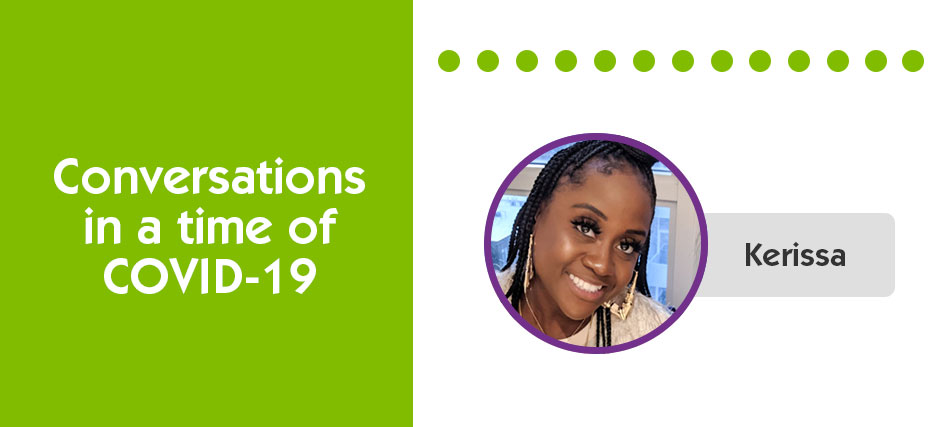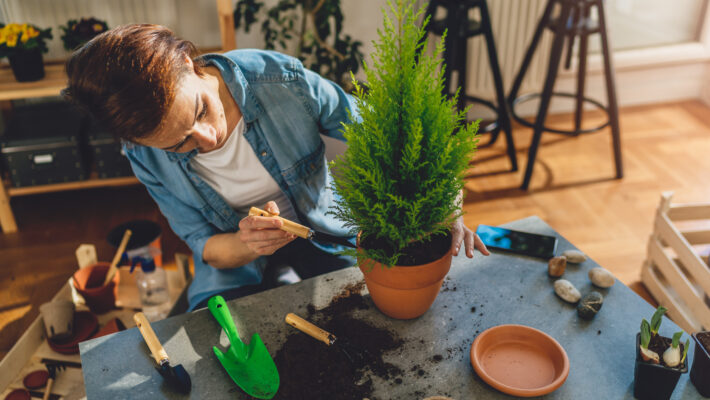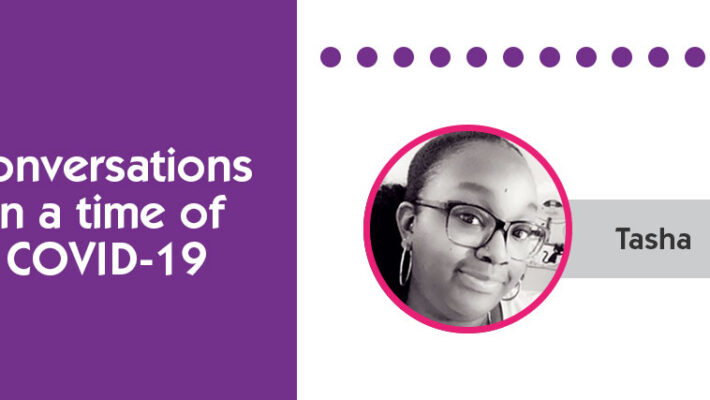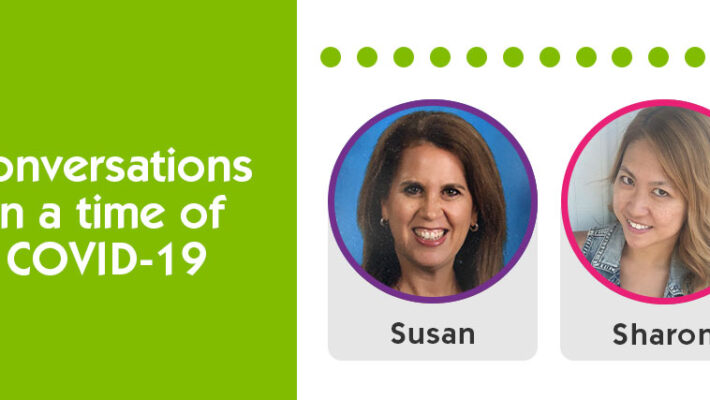This series profiles the experiences of RECEs as they navigate the pandemic.
We sat down with Kerissa Brewster as an RECE in kindergarten who’s now supporting her classroom and their families online.
Q: In what sector area do you normally practise, Kerrisa?
A: First, I want to say that I was so pleased to be asked to participate in this interview! Thank you.
I traditionally work in a kindergarten classroom in the west end of Toronto. Our kindergarten class is unique because we have a double class with 58 children supported by four educators (two RECEs and two members of Ontario College of Teachers).
I also work as an RECE in licensed child care, part of the after-school program. There, I connect with many of the same children and families. Both the child care and school-board staff have great professional relationships which have become even stronger through this pandemic.
Q: In what ways has COVID-19 affected your professional role, relationships and practice setting?
A: Physically, everything has changed. Since the school closed, I’ve had no physical contact with colleagues, children and their families. I miss being nearby a lot because my relationships with them are what make me thrive.
Our practice setting has shifted from school to the home where I continue to maintain my professional role and boundaries. The Ontario Ministry of Education shared tips about privacy for virtual platforms with educators. We all use our professional email accounts and Google Classroom. We refrain from using platforms like Facebook and Instagram for work.
As time passes, I continue to think of us as a work family where we support each other, especially now.
Q: Practice, at this time, is about supporting one another and maintaining our health, as well as the health of our families and communities. How are you feeling?
A: It’s been challenging, but I’m doing all right. I find that I’m more tired than I usually am, and I wonder if that is the result of additional screen time. I do miss being with the children – interacting with them energizes me. I also worry about my friends and family, and the health of my community.
Q: During this time of isolation and uncertainty, what are you finding useful in supporting your physical, mental and emotional health?
A: I usually work a lot, so it’s nice being closer to home right now. To maintain my health, I am staying closely connected to my loved ones and trying to get enough rest.
Q: Relationships are central to our profession. How are you maintaining collaborative relationships?
A: We continue to collaborate and plan curriculum on a day-to-day basis that considers the needs of each child and their families. We share information and ideas, and support and motivate each other.
Perhaps now, more than ever, we’re responding to families’ emails and arranging ways to meet their individual needs. Some of our families are deemed essential workers, so we understand some of our approach doesn’t work for them. As a result, we keep lines of communication open so we can support these parents in the way they need us most.
Because I’m also an employee of the child care centre, our community partner, I’m in regular contact with the RECEs and supervisor there, too. We’ve just begun discussing how we might connect with families to let them know that we’re here for them. We’re mindful that they’re navigating at-home learning, so we don’t put pressure on them to communicate with us. But we want them to know we’re here to support them.
Q: What are some of the challenges you’ve experienced related to building relationships and fostering collaboration in this time of physical distancing?
A: The biggest challenge for me has been the lack of consistency in our interactions. My life went from speaking with peers, children and parents daily and using their body language to gauge and validate our interactions. Now, I read texts and try to determine tone and pitch based on past interactions with individuals. It can be super hard to navigate.
I think as educators we feel a lot – we’re humans, and this situation doesn’t always seem human. I am, however, still grateful to be able to maintain a relationship with each of my families through Google Classroom. I know these families have a lot going on, so it’s honestly a privilege.
Q: We are currently practising in new and evolving ways. What are you learning to support the safety, health and well-being of others in your practice setting?
A: I put a lot of work into the material that I post and am energized by the way families respond. Some are still navigating this new normal and touch base when they can. I empathize with that as my new normal looks different every day.
Our teaching team considered all options when connecting with children and their families. However, we realized we had to provide an equitable yet engaging way to facilitate our program. That led us to pre-record our interactions. This allows families to get work done when and if, they can. Families can then return to our videos on their schedule.
Q: Can you share a positive story about your experience navigating new modes of communications or practice?
A: Even though we are further way, there is more human-ness happening right now. I’m getting to know things about children, families and my colleagues that I may have never learned if the pandemic hadn’t interrupted life.
A parent reached out to me and my teaching-partner to let us know that her little one was really motivated by our videos and learning prompts. She asked us to connect with her to help keep her child motivated to continue learning. It made me realize just how important RECEs are in the lives of children and their families. I feel lucky to work in this community.
Just before COVID-19 hit, we were reading a book called Hair Love as a class. Each child would take the book home, along with a scrapbook and markers, and document their hair routine. This book study meant so much to me as a black educator, not only in getting children and families to see the celebration of black hair in text, but to also celebrate all of our hair love. Rather than our study ending just because we were now connecting at a distance, I filmed a video of myself reading the book and then explaining my own hair routine and combing my hair. It was a meaningful way to restore some routine to our new online classroom.
One more thing: this new experience is cool because I can see my family more, and we can appropriately share our work and get each other’s perspectives. My family is really seeing the value of the work I do every day and that means a lot to me.
Q: Do you have any final thoughts to share with other RECEs?
A: We’re all in this together. Even though this situation is really hard, it, now more than ever, it validates how important our role is in the lives of children and their families.
We provide something that is so important to children and families, and it cannot be duplicated. What each Early Childhood Educator brings to their program is necessary. I have never been prouder to be an RECE.
Interested in Hair Love? The book that Kerissa’s class was reading has been adapted into an Oscar-winning short film that you can watch here on YouTube.




